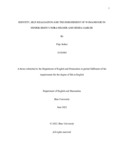| dc.contributor.advisor | Noman, Abu Sayeed | |
| dc.contributor.author | Sarkar, Puja | |
| dc.date.accessioned | 2022-09-18T10:11:30Z | |
| dc.date.available | 2022-09-18T10:11:30Z | |
| dc.date.copyright | 2022 | |
| dc.date.issued | 2022-06 | |
| dc.identifier.other | ID 18103001 | |
| dc.identifier.uri | http://hdl.handle.net/10361/17226 | |
| dc.description | This thesis is submitted in partial fulfillment of the requirements for the degree of Bachelor of Arts in English, 2022. | en_US |
| dc.description | Cataloged from PDF version of thesis. | |
| dc.description | Includes bibliographical references (pages 61-64). | |
| dc.description.abstract | Henrik Ibsen wrote about 19th century sensitive, taboo topics. His work addresses aspects like
corruption, psychological struggles, women’s rights, repressive social beliefs and such. Although
Ibsen was never a self-proclaimed feminist, many of his plays inclduding The Doll’s House
(1879) and Hedda Gabler (1980) have been considered to be significant additions to feminist
literature. His complex female characters have been criticised heavily. While some argue that
Nora Helmer and Hedda Gabler are femenist heroines, some argue otherwise. The plays’
anti-femienist criticism contributes to Ibsen’s humanist philosophy. This paper will address
secondary journals and other critics in analysing Nora and Hedda’s impact in promoting
women’s rights. Looking at the contrasting themes of womanhood and identity, how these
women navigate through a man’s world to find their unique selves and their success in doing so,
this paper will aim to answer if the characters are successful in advocating for women’s
individuality. | en_US |
| dc.description.statementofresponsibility | Puja Sarkar | |
| dc.format.extent | 64 pages | |
| dc.language.iso | en | en_US |
| dc.publisher | Brac University | en_US |
| dc.rights | Brac University theses are protected by copyright. They may be viewed from this source for any purpose, but reproduction or distribution in any format is prohibited without written permission. | |
| dc.subject | Womanhood | en_US |
| dc.subject | Unique identity | en_US |
| dc.subject | Feminism | en_US |
| dc.subject | Humanism | en_US |
| dc.subject.lcsh | Literature--Women | |
| dc.title | Identity, self-realization and the embodiment of womanhood in Henrik Ibsen’s Nora Helmer and Hedda Gabler | en_US |
| dc.type | Thesis | en_US |
| dc.contributor.department | Department of English and Humanities, Brac University | |
| dc.description.degree | B.A. in English | |

